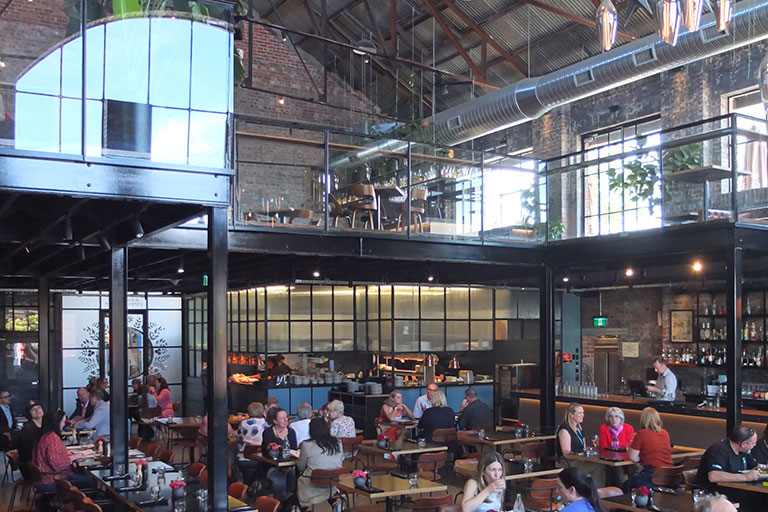Federal Mills is a heritage-listed group of brick buildings in Victoria’s second largest city, celebrated for their role when Geelong rode on the sheep’s back as the major export port for the local wool clip. But just as manufacturing has moved offshore, the wool mills went offshore.
However, in 2013, local family the Hamiltons took up the challenge to do something with the 14-acre site with 35,000m2 of ex-industrial buildings that once employed thousands. The site was designed by then government architect John Murdoch with current managing director of the Hamilton Group, Cam Hamilton, saying it was designed to be a showcase of what could be done with an industrial area.
Its heritage has been retained but reimagined to feel more like a campus.
Hamilton acknowledged seeking anchor tenants was initially slow, but now it is a busy workplace and a growing hospitality precinct with leafy gardens, ample terraces and open spaces for meeting breakout sessions.
A highlight of the Mills is the former coal-fired power house for the whole site. It is now known as 1915, a 900m2 event venue for 200 to 500 attendees, Hamilton says. It’s an impressive double-storey red brick building with a vaulted ceiling and a wall of windows allowing natural light to flood in. Above the Mediterranean-style restaurant is a mezzanine floor with an adjoining room, Switch – the former switchboard room for the power grid that still houses some of the old equipment.
Event space extends around the building – perfect for cocktails – all sitting beneath a tall brick chimney that has long been a beacon along Melbourne Road as you enter Geelong.
While some locals questioned the wisdom of taking on the site full of old buildings, Hamilton points out that his business has experience with former industrial sites.
“We’ve been doing this for a while and we have a good stock of old industrial buildings around Geelong and sometimes you just have to have the belief that something good is going to happen,” says Hamilton.
Acknowledging Geelong had seen its share of difficult times he says the reduction of tariffs had led to the demise of the woollen mill, but the area now had 50 to 60 businesses onsite from start-ups and IT companies to accountants, lawyers and the regional office of Bendigo Bank.
Hamilton says Geelong has moved on from the lost opportunity to host the Commonwealth Games in 2026, although he was personally affected. His company was about to sign a lease with the state government for a 4000m2 space to be the administrative offices of the Games. He remains positive that Geelong will again prove resilient and is hopeful that the Spirit of Tasmania moving to Geelong will positively impact the city. Given the growth of Federal Mills, he believes there is potential for hotel accommodation to be built near the precinct.
He says the newest business coming to Federal Mills in April is “Burleigh Heads iconic cafe, Paddock Bakery – a huge coup for Federal Mills and Geelong as a whole”.




















